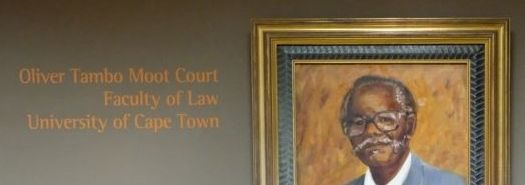
The Oliver Tambo Story
Oliver Reginald "O.R." Tambo was born on 27th October 1917 at Mbizana, in eastern Mpondoland, Eastern Cape, where he enjoyed an active and traditional childhood, nurtured by a large family. His father, Mzimeni, was an entrepreneur who instilled in his young son the wisdom of a good education. Oliver was enrolled in Holy Cross missionary school, where, as an eager eleven-year-old, he developed a particular aptitude for discussion and debate. After completing high school at St Peters in Johannesburg, he enrolled for a BSc degree, graduating from the University of Fort Hare in 1941. He carried on his studies to obtain his Higher Diploma in Education.
Of Oliver Tambo's time as a student at Fort Hare, Nelson Mandela writes:
He had first impressed me at Fort Hare when I noticed his thoughtful intelligence and sharp debating skills. With his cool logical style he could demolish an opponent's argument - precisely the sort of intelligence that is useful in a courtroom.
The admiration was mutual. In 1953, after Tambo had taught maths at St Peters for a decade, a career shift into the practice of law saw Mandela and Tambo become the first, and at that time the only, black African law firm in South Africa. Tambo had by then completed his law qualifications through UNISA, and had served articles to become an attorney. As partners, Mandela and Tambo fought in the courts for equality for all South Africans, a goal that was to elude them for a further 40 years.
Tambo's links with the ANC were forged early in his life. He was a founding member of the ANC Youth League in 1944, and was elected to the Transvaal executive of the ANC in 1946. By 1955 he was Secretary General in which capacity he played a leading role in the Congress of the People that same year. With this high profile, Oliver Tambo, with most of the ANC leadership including Nelson Mandela, was arrested in December 1956 and charged with high treason. He was released after two and a half weeks in prison, though the preliminaries of the treason trial continued for over a year. Charges against Tambo were withdrawn in December 1957. Only in August 1959 did the trial against the remaining 30 defendants begin in earnest.
On 8 April 1960 the ANC was declared an illegal organisation under the Suppression of Communism Act. The ANC leadership decided that Oliver Tambo, by then Deputy President of the ANC, would best serve the movement by going into exile and building international ties which would mobilise support for reform within South Africa. With the dedicated support of his wife Adelaide, he became ambassador at large and established missions in 27 countries by 1990. He later took an active role in the organisation of the armed struggle against apartheid.
After the death of Chief Albert Luthuli in 1967, Tambo was appointed President-General of the ANC, and led the organisation in exile until his eventual return to South Africa in December 1990. His presidency brought with it that of Commander in Chief of Umkhonto we Sizwe. In the final years of negotiation towards the election of the first democratic government in South Africa in 1994, Oliver Tambo brought his ambassadorial and conciliatory skills to bear on readying the country for a return to the normality of international relations, arguing even for a gradual relaxation of sanctions. But he was not to see the free South Africa for which he had struggled for his entire adult life. In April 1993, only a year before the country saw all its people streaming to the polls for the first time, Oliver Tambo succumbed to a stroke.
Nelson Mandela writes of his passing:
[Plato] the philosopher classifies men into groups of gold, silver and lead. Oliver Tambo was pure gold; there was gold in his intellectual brilliance, gold in his warmth and humanity, gold in his tolerance and generosity, gold in his unfailing loyalty and self-sacrifice.
This is the calibre of the man after whom Mrs Adelaide Tambo has graciously consented we may name the Moot Court of the Faculty of Law of the University of Cape Town. She does the Law Faculty great honour.
The Portrait
The original oil painting of Oliver Tambo was specially commissioned by the Faculty. The work was made possible by the generosity of Mrs Adelaide Tambo in providing the artist with a broad selection of very special personal photographs and personal records of Oliver Tambo from which the measure of the man could be properly assessed. The painting depicts Tambo at the stage of his life when he was ambassador in exile.